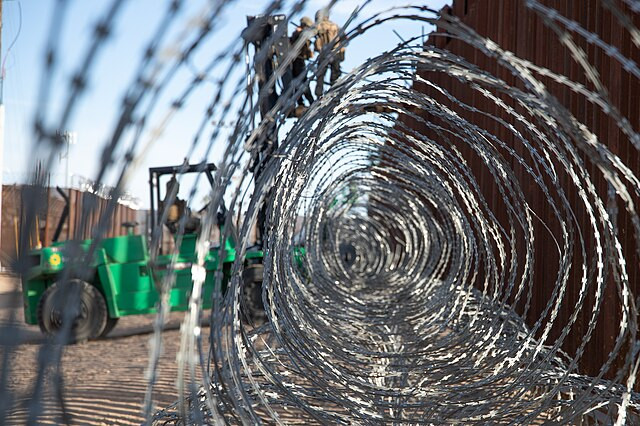The recent surge of asylum seekers at the U.S.-Mexico border includes many fleeing the aftermath of Mexico's most violent election season. The June 2 elections, the largest in the country's history, were marred by unprecedented levels of bloodshed and intimidation. Political candidates were targeted, with at least 34 killed and hundreds more threatened. This chaos has driven many to seek refuge across the border in the United States.
Norma, a 35-year-old shop owner and political coordinator, fled her hometown on the outskirts of Mexico City after receiving threats following a police complaint she filed against a rival political party. The threats intensified after the rival party won the municipal elections. "After the vote, it got ugly in my city," she said, explaining her decision to leave.
Norma's escape brought her and her three children to a dusty road in southern Arizona, just after crossing the border. They are among several migrant families who told CNN they were escaping the violence and instability triggered by Mexico's elections. Many of these families are unaware of the recent U.S. executive order that restricts asylum requests during periods of high border traffic.
A few miles east, other Mexican families had taken shelter in a tent set up by a local humanitarian group, waiting for Border Patrol agents. These families also cited political violence, general insecurity, and threats from criminal organizations as reasons for their flight.
The June 2 election was historic not only in scale but also in the level of violence. With 20,000 electoral positions up for grabs, criminal organizations sought to influence the outcomes, resulting in widespread fear and intimidation. Carin Zissis, an expert on Mexico, noted that local-level elections were particularly affected, as control over police and fiscal resources was at stake. "The violence and threats were meant to show who was in control," Zissis said.
The U.S. government is closely monitoring the situation, aware that political instability in Mexico could lead to increased migration. A Homeland Security official acknowledged the impact of such events on migration patterns, noting, "Elections always provoke uncertainty, especially among the migrant population."
The Mexican government, under President Andres Manuel Lopez Obrador, has faced criticism for its handling of the violence and its role in managing migration. Salvador Guerrero, director of the Alaide Foppa Refugee Legal Clinic in Mexico City, expressed concern that Mexico's efforts to serve as a buffer for U.S. migration issues have diverted resources from internal security. "The National Guard was created to protect Mexico, but it's also being used to manage migrants," he said.
In addition to the violence, Mexico is grappling with a broader security crisis. The country has one of the highest homicide rates in the world, with over 100,000 people reported missing. The think tank Mexico Evalua reports that 95% of crimes in Mexico went unsolved in 2022, underscoring the pervasive impunity.
Norma and her children's ordeal is a stark illustration of the human toll of Mexico's political violence. After being detained by U.S. Border Patrol, they were deported back to Mexico. "They treated us with respect but said asylum wasn't an option," Norma said.
The Biden administration's recent asylum restrictions, designed to manage high volumes of border crossings, have drawn criticism from immigrant rights advocates. They argue that the policy endangers vulnerable people and undermines the U.S. tradition of providing refuge. Critics also point out the administrative challenges and potential humanitarian crises that could arise from the new rules.
Biden's new asylum restrictions, announced on Tuesday, aim to limit the number of migrants eligible for asylum when the U.S. southern border is deemed overwhelmed. The proclamation would bar migrants from being granted asylum during high-volume periods at the border, which has been a contentious issue. Biden defended his unilateral action, stating that Republican opposition left him no choice. "Republicans have left me no choice," Biden said. "I believe immigration has always been the lifeblood of America."
Former President Donald Trump criticized Biden's move, calling it a political stunt. Trump's former advisor, Stephen Miller, and Tom Homan, former acting director of Immigration and Customs Enforcement, echoed these sentiments, suggesting the timing was politically motivated.
The restrictions will be triggered when border encounters exceed 2,500 per day, a threshold that current conditions have already surpassed. This means Biden's order will likely take effect immediately. The U.S. Department of Homeland Security acknowledged that while enforcement efforts with Mexico have reduced illegal crossings, smuggling networks adapt quickly, necessitating further action.
The administration's order mandates that migrants who cross the border illegally and do not express fear of returning to their home countries will face immediate removal and potentially severe penalties, including a five-year reentry bar or criminal prosecution. Those who express fear will undergo more stringent screening by U.S. asylum officers.
"We're troubled to see this administration raise the bar on asylum seekers who are coming to our southern border and exercising a legal right," said Krish O'Mara Vignarajah, president and CEO of Global Refuge. The U.N. refugee agency also expressed concern, urging the U.S. to uphold its international obligations.






